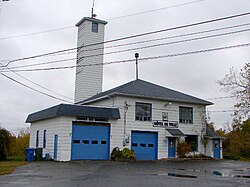Duparquet
Duparquet | |
|---|---|
 Town Hall of Duparquet | |
 Location within Abitibi-Ouest RCM | |
| Coordinates: 48°30′N 79°14′W / 48.500°N 79.233°W[1] | |
| Country | Canada |
| Province | Quebec |
| Region | Abitibi-Témiscamingue |
| RCM | Abitibi-Ouest |
| Constituted | April 13, 1933 |
| Government | |
| • Mayor | Denis Blais |
| • Federal riding | Abitibi—Témiscamingue |
| • Prov. riding | Abitibi-Ouest |
| Area | |
• Total | 156.36 km2 (60.37 sq mi) |
| • Land | 121.17 km2 (46.78 sq mi) |
| Population (2021)[3] | |
• Total | 716 |
| • Density | 5.9/km2 (15/sq mi) |
| • Pop 2016-2021 | |
| • Dwellings | 389 |
| Time zone | UTC−05:00 (EST) |
| • Summer (DST) | UTC−04:00 (EDT) |
| Postal code(s)/ | |
| Area code | 819 |
| Highways | |
| Website | duparquet |
Duparquet (French pronunciation: [dypaʁkɛ]) is a city in northwestern Quebec, Canada, in the MRC d'Abitibi-Ouest of the Abitibi-Témiscamingue region. It covers 157.4 km2 (60.8 sq mi) and had a population of 716 as of the Canada 2021 Census.
History

In 1912, a rich gold vein was discovered near Lake Duparquet by a prospector named Beattie. He set up the Beattie Gold Mine company that began operation in 1933. That same year, the new community forming at the mine was incorporated as Ville de Duparquet, named after the geographic township in which it is located. The township was named in 1916 in honour of Jean-Annet Chabreuil Du Parquet, a grenadier captain of the La Sarre Regiment, that was part of General Montcalm's army.[1]
After producing 1 million ounces of gold and killing at least 27 miners, including 4 in a landslide on 9 July 1946, the mine closed in 1956. But the owners of the mining rights are currently considering reopening it as an open-pit mine.[4]
Demographics
In the 2021 Census of Population conducted by Statistics Canada, Duparquet had a population of 716 living in 342 of its 389 total private dwellings, a change of 7.5% from its 2016 population of 666. With a land area of 121.17 km2 (46.78 sq mi), it had a population density of 5.9/km2 (15.3/sq mi) in 2021.[3]
| 2021 | 2016 | 2011 | |
|---|---|---|---|
| Population | 716 (+7.5% from 2016) | 666 (1.4% from 2011) | 657 (2.8% from 2006) |
| Land area | 121.17 km2 (46.78 sq mi) | 123.57 km2 (47.71 sq mi) | 123.63 km2 (47.73 sq mi) |
| Population density | 5.9/km2 (15/sq mi) | 5.4/km2 (14/sq mi) | 5.3/km2 (14/sq mi) |
| Median age | 48.4 (M: 50.0, F: 45.2) | 50.9 (M: 51.2, F: 50.2) | 48.3 (M: 48.3, F: 48.2) |
| Private dwellings | 389 (total) 342 (occupied) | 389 (total) | 359 (total) |
| Median household income | $73,500 | $62,464 | $.N/A |
|
|
| |||||||||||||||||||||||||||||||||||||||||||||||||||||||||
| Source: Statistics Canada[10] | |||||||||||||||||||||||||||||||||||||||||||||||||||||||||||
Mother tongue (2021):[11]
- English as first language: 0.7%
- French as first language: 98.6%
- English and French as first language: 0%
- Other as first language: 0%
Government
Municipal council
As of 2023:[2]
- Mayor: Denis Blais
- Councillors: Donald Baril, Marlene Doroftei, Claudette Macameau, Véronique Drouin-Lecompte, Chantal Provencher, Solange Gamache
- General Director: Chantal Poirier
Notable people
- Tim Horton, hockey player and entrepreneur, lived in Duparquet as a child
- Johanne Morasse (born March 12, 1957), a Quebec politician and teacher
- Walter Ostanek, polka musician and "Canada's Polka King"
- Elmer "Moose" Vasko, Chicago Black Hawks player during the 1960s.
References
- ^ a b "Duparquet (Ville)" (in French). Commission de toponymie du Québec. Retrieved 4 January 2011.
- ^ a b c "Duparquet". Répertoire des municipalités (in French). Ministère des Affaires municipales et de l'Habitation. Retrieved 6 April 2021.
- ^ a b c "Duparquet, Ville (V) Quebec, census profile". 2021 Census data. Statistics Canada. Retrieved 22 April 2022.
- ^ Patrick Rodrigue (18 September 2009). "Une mine à ciel ouvert à Duparquet?" (in French). canoe.ca. Archived from the original on 11 July 2012. Retrieved 4 January 2010.
{{cite web}}: CS1 maint: unfit URL (link) - ^ "2021 Community Profiles". 2021 Canadian census. Statistics Canada. 4 February 2022. Retrieved 19 October 2023.
- ^ "2016 Community Profiles". 2016 Canadian census. Statistics Canada. 12 August 2021.
- ^ "2011 Community Profiles". 2011 Canadian census. Statistics Canada. 21 March 2019.
- ^ "2006 Community Profiles". 2006 Canadian census. Statistics Canada. 20 August 2019.
- ^ "2001 Community Profiles". 2001 Canadian census. Statistics Canada. 18 July 2021.
- ^ 1941, 1951, 1956, 1961, 1966, 1971, 1976, 1981, 1986, 1991, 1996, 2001, 2006, 2011, 2016, 2021 census
- ^ "Duparquet Census Profile, 2021 Census". 2021 Census data. Statistics Canada. 15 November 2023. Retrieved 24 October 2024.


